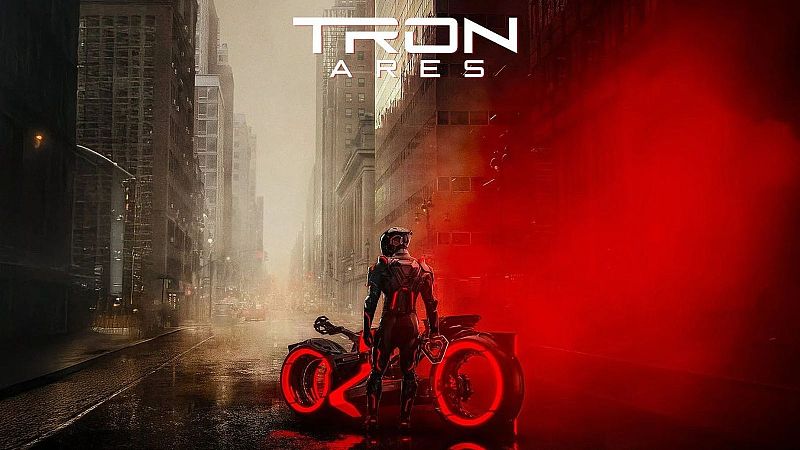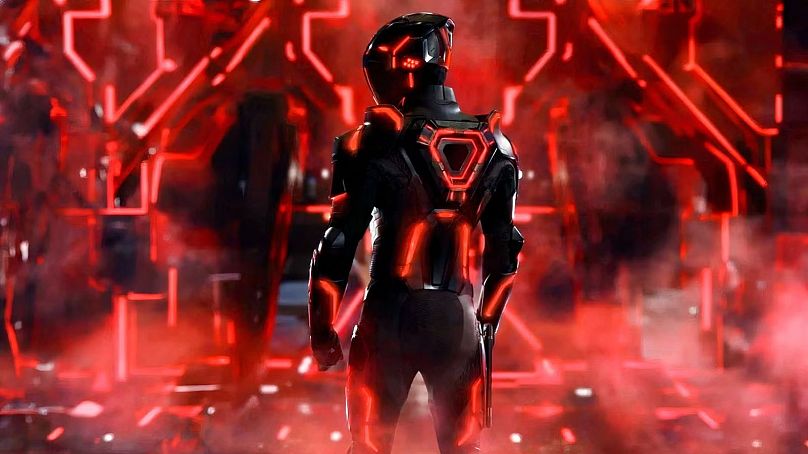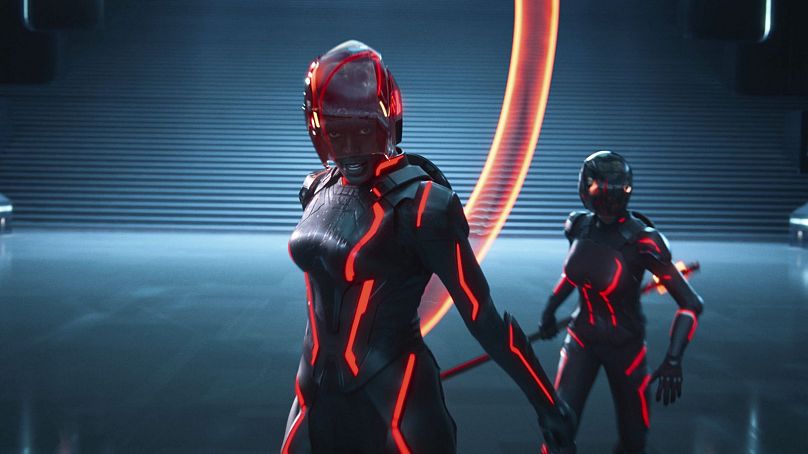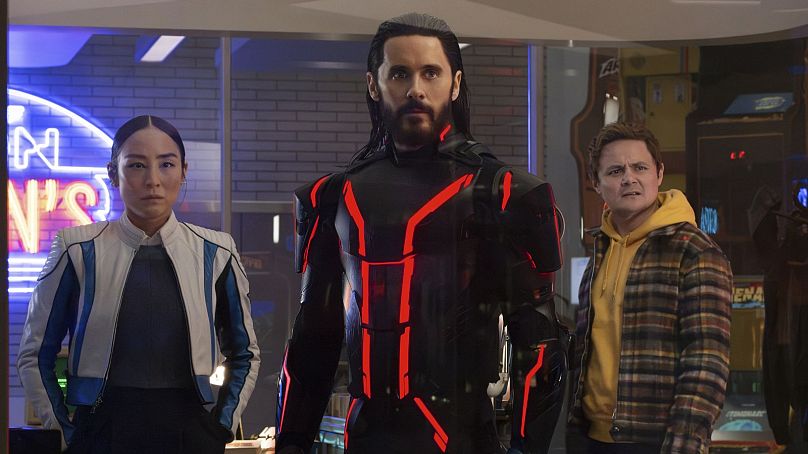Euronews Culture's Film of the Week: 'Tron: Ares' - AI-ay-ay

“No Going Back” reads the Tron: Ares tagline.
Why couldn’t Disney heed its own advice?
Greed. The answer’s most definitely greed - as well as the desperate desire to recycle an IP through cynical nostalgia-baiting to better generate interest in a franchise the House of Mouse wants to turn into a profit opportunity. All this despite the fact Tron’s cultural stock dried out in the 80s.
So, 15 years after the underwhelming Tron: Legacy and 43 years since the original Tron, one of the first films to extensively use CGI, audiences are going back into The Grid’s digital landscape for a third entry. Or rather, in a reversal of the established parameters, the computer programmes are coming into our world in Joachim Rønning’s Tron: Ares.
We start with a recap intro which gives audiences all the rushed backstory they need: intelligent life from inside the machine; Jeff Bridges’ Kevin Flynn disappearing; his son Sam Flynn not returning; and the ongoing race for AI supremacy, which pits the original film's ENCOM against newcomer Dillinger Systems.
The former is led by game designer Eve Kim (Greta Lee), who sees AI as a tool for medical and environmental advances. The latter is headed by the circuit-board-tattooed tech bro Julian Dillinger (Evan Peters), who wants to create the hardware of the future and comes out with lines like “Military AI is the future!”
No points for guessing who we’re supposed to root for.
Both CEOs have access to the same revolutionary tech, a particle laser which allows them to 3D-print anything they design in the virtual world. Eve prints an orange tree; Julian materialises tanks and his “ultimate soldier” Ares (Jared Leto). However, both lack Flynn’s lost “Permanence Code” - the algorithmic key that allows their artificial creations to remain intact in the real world for more than 29 minutes. Without it, the printed creations crumble into pixilated dust when the clock runs out.
The race is on to find the digital MacGuffin, with Dillinger’s plans complicated by Ares, who decides to abandon his role as “defender of The Grid”. He starts to yearn for some sentient permanence of his own, having been mesmerized by some rain.
Tron had a killer soundtrack with music pioneer Wendy Carlos’ electro score.
The belated sequel was essentially the backdrop for a new Daft Punk album.
So kudos to Disney, as they’re keeping consistent by replicating the same formula: Tron: Ares ends up as the vehicle for a new Nine Inch Nails project, and not a hell of a lot else. The score is the best part of this third adventure, with Trent Reznor and Atticus Ross providing a bone-crushing industrial soundtrack that dominates every frame of the movie.
Beyond that and some gorgeously rendered orange ribbons carving out a cityscape in one light cycle chase scene, Tron: Ares is as agonizingly generic as it is a waste of time and resources.
Everyone is underserved by a terrible script, whose narrative drive is a limp mashup of “Frankenstein” and “Pinocchio”, and whose ideas on characterization could fit on a wafer-thin floppy disc. As for the dialogue, it sounds like it's been sloppily ChatGPTed into existence. Somewhat fittingly.
Pour one out for the overqualified women of Tron: Ares, who are the main victims here.
Greta Lee, who showed that she has nuance to spare in the superb Past Lives, tries her level best but is saddled with an overabundance of expository dialogue and a backstory which actually gets mansplained to her at one point; Jodie Tuner-Smith scrapes by as Athena, another sentient app who is only there to menacingly pout; and Gillian Anderson, who turns up as Julian's disgruntled mother, barely gets enough screentime to make a lasting impression.
Their time and talent could have been better used. The paychecks, however, should allow them to star in worthier projects. So that’s a win.
Not that anyone was expecting profound meditations on humanity's role in a full-on technological world. However, “Being human is hard” just doesn’t cut it.
“I should have majored in English Lit,” says Eve as she fights to stay alive.
The same applies to the screenwriter. Say what you will about Joseph Kosinski’s 2010 sequel, at least it had the decency of giving us a few New Agey musings on how science and philosophy could be impacted by AI advances - as well as Michael Sheen’s take on a coked-up David Bowie and Jeff Bridges delivering the line “bio-digital jaaaazz, man”.
Granted, the 2010 de-aging special effects made him look like a deepfaked pancake, but even that visual abomination was miles better than hearing Jared Leto’s Ares repeatedly profess his admiration for Depeche Mode.
Which brings us to Tron: Ares’ worst offender: Leto – who also serves as a producer on the film.
Charitably, his performance just about works, as he plays a soulless artificial intelligence and therefore doesn’t have to bother his pretty long locks with... you know, acting. Less charitably, he’s a charisma void where a performer should be, one who can’t muster a flicker of emergent humanity or nascent empathy, even as his character is supposedly grappling with an identity crisis.
When Arnold Schwarzenegger – a performer not known for his extensive acting range – can illicit emotion as a cybernetic killbot in the Terminator series, then there’s no excuse for an Oscar winner playing an anthropomorphic murderApp discovering the limitations of its programming to deliver a performance this terminally poor. It’s even more galling to witness when Lee attempts some chemistry with Leto. She may as well have been acting opposite a vacant phone screen.
All this to say that Tron: Ares is a loud light show encased in an exhumation that no one asked for.
Hey, at least we got a new NIN album this year... What a shame you need to sit through a dead-eyed Leto in a glowing onesie to listen to it interact with some pretty decent special effects.
“Until we meet again...” threatens Ares in some last-minute sequel baiting.
That’s a resounding “Derezz, already!” from us.
Tron: Ares is out in cinemas now.
Today





